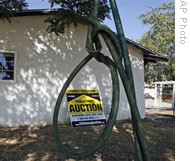voa标准英语2008年-Global Markets Continue Downward Spiral(在线收听)
 |
| An abandoned single family home offered in lender foreclosure public auction is seen in Moreno Valley, California, 24 Oct 2008 |
Many economists cite a rash of U.S. home foreclosures as the root cause of tight credit that has strangled economic growth in the United States and leading industrialized nations around the world. But despite a federal economic stimulus package and a massive financial rescue package, U.S. home foreclosures continue unabated amid an economic downturn that appears to be worsening.
In addition to homeowners who have defaulted on their mortgages, hundreds of thousands of Americans are behind in their mortgage payments and are in danger of foreclosure.
The Federal Housing Administration, or FHA, is streamlining the process under which two mortgage giants can modify delinquent loans to give borrowers more favorable terms in hopes of avoiding default. The agency took control of those mortgage firms, Fannie Mae and Freddie Mac, earlier this year.
 |
| Federal Housing Finance Agency Director James Lockhart, attends a news conference, in Washington, 11 Nov 2008 |
"Foreclosures have increased almost 150 percent over the last two years," said FHA Chairman, James Lockhart. "Foreclosures hurt families, their neighbors, whole communities, and the overall housing market."
"We need to stop this downward spiral. Today, we are announcing a major program designed to greatly reduce preventable foreclosures with a simplified, streamlined loan modification program to get struggling homeowners into mortgages that they can afford," he added.
Tuesday saw more U.S. companies announce disappointing earnings and layoffs. On Monday, German-based shipper DHL announced a reduction in U.S. operations and a cut of about 9,500 American jobs. More than a million jobs have been lost in the United States during the last year, pushing the unemployment rate up a full point in the same time period.
Among the sectors shedding jobs is the U.S. automobile industry. Congress has already approved $25 billion in low-interest loans to America's top-three carmakers to help them retool production and make more fuel-efficient vehicles. Aides close to President-elect Barack Obama are among those who say the industry needs another $25 billion in government aid to stave off bankruptcy.
Analyst Peter Brown of the trade magazine Automotive News says the situation is dire for General Motors and other U.S. carmakers.
"Right now the choices are pretty stark: bailout or failure," he said. "If GM [General Motors] fails, [then] all kinds of suppliers fail. The other two Detroit automakers would soon fail. There would be a large collapse of a very important part of the economy."
Carmakers are the largest component of America's dwindling manufacturing base.
 |
| Barack Obama (r) and George Bush in the Oval Office of the White House, 10 Nov 2008 |
President-elect Obama is reported to have pushed for a quick infusion of government cash for automobile makers when he met with President Bush at the White House on Monday.
For its part, the Bush administration has urged Congress to ratify a free trade pact between the United States and Colombia as a means to boost economic activity for both nations. So far, Congress has refused to consider the accord. The White House denied any attempt by Mr. Bush to link aid for carmakers to passage of the free trade deal.
The near-constant drumbeat of negative economic news continues to punish stock markets. Shares in Tokyo fell by three percent, while Hong Kong saw a plunge of nearly five percent. Major European markets were down between three and six percent.